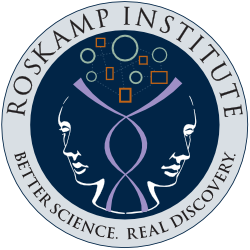Admission Requirements
For the Program
The Roskamp Institute, jointly with The Open University, UK offers a doctoral degree in Neuroscience. The Open University is the awarding institution for the Doctorate of Philosophy degree.
Prospective candidates for admission for the Ph.D program must have:
- For UK students: a Bachelor’s degree of class 2.1 or higher in a biological sciences field.
- For US students: a Master’s degree in a biological sciences field or a Bachelor’s degree plus either one year of post-graduate full-time laboratory research at the Roskamp Institute or two years of post-graduate full-time laboratory research with another institution and demonstrated productivity.
- For students from other countries: equivalency to either UK or US student requirements as stated above.
Selection and Admissions Policy
We utilize a three-part selection process.
Step 1: the Program Administrator reviews applications for completeness and eligibility.
Step 2: Eligible applications move to the screening committee (3 scientist/supervisor members) who thoroughly review the applications and select those who are best qualified for the program.
Step 3: Applicants are interviewed in-person or by video-conference by the Roskamp Admissions Committee (which consists of all OU supervisors and potential supervisors). This committee evaluates the candidates based on eligibility, suitability for the program and for the available projects, and overall qualifications (intellect, motivation, aptitude, existing skills, and personality) as a PhD candidate. Minutes are taken and they include the post-interview discussion.
Admission will be based on an evaluation by a Roskamp Institute committee and the Open University. The Admission process will weigh many factors including the applicant’s scholastic record, prior performance in laboratory research, letters of recommendation, statement of purpose, and ultimately personal interviews. Successful candidates will be registered with The Open University in the United Kingdom.
Typical PhD Projects
Biomarker Discovery in Gulf War Illness Gulf War Illness (GWI) is a chronic multisymptom disorder affecting returning veterans from the 1991 Gulf War conflict, which is now recognized to have been caused by combination exposure to agents such as the anti-nerve gas agent Pyridostigmine Bromide, and pesticides – collectively Gulf War agents. This project will involve molecular characterization of mouse models of GW agent exposure both in the brain and the periphery, and translation of these findings to analysis of blood samples from human GWI patients to identify biomarkers of GWI associated with particular aspects of clinical presentation. Laboratory research will include processing and analysis of human blood samples and blood and tissue samples from mice; coordination and management of collection, processing and storage of clinical samples and clinical information relating to patient samples; database management; handling and neurobehavioral analyses of mouse models of GWI; omic approaches involving liquid chromatography and mass spectrometry; routine molecular biology and molecular genetic techniques.
Influence of apoE on LRP1 function and amyloid transport across the BBB Alzheimer’s disease (AD) is the sixth leading cause of death in the United States and is characterized, in part, by the deposition of beta-amyloid (Abeta) proteins in the brain. This project will examine the relationship between apolipoprotein E, which has been implicated in AD progression, and lipoprotein receptors, which are responsible for removing Abeta from the brain. Various studies will be conducted to describe the interactions between these proteins including expression and proteolysis, internalization and subcellular trafficking, and protein-protein binding. Laboratory research will include various cell and molecular biology techniques such as cell culture, fluorescent microscopy, and immunoblotting, in addition to general animal handling including blood/tissue collection and processing.
Mechanism of CD40 signaling to APP metabolism and tau CD40, a member of the tumor necrosis factor receptor superfamily, and its cognate ligand CD40L, play a significant central nervous system role in the development of Alzheimer’s disease (AD). We have shown that pharmacological or genetic interruption of the CD40/CD40L interaction results in the mitigation of AD-like pathology in vivo in transgenic AD mouse models, evident by a drastic reduction of soluble and insoluble amyloid-beta (A’), and an accompanying decrease in inflammation and tau protein hyper-phosphorylation (an additional pathological hallmark of AD). To date, most CD40/CD40L signaling has been attributed to the involvement of TRAFs binding to the cytoplasmic domain of CD40. However, our results suggest that CD40/CD40L-induced production of A’ can be independent of TRAF dependent signaling. In addition, we show that CD40 ligation triggers internalization of APP, and that internalization by endocytosis is associated with increased A’ production. The current project goal is to understand the connection between CD40 signaling and the overall pathogenesis of AD by i) investigating the TRAF independent mechanisms linking CD40 internalization to amyloidogenic APP processing; ii) determining which kinases mediate constitutive CD40 signaling of tau phosphorylation and which ones mediate hyperphosphorylation in the brains of the AD mouse model.
Submit Your
Application
Applicants for the program will be required to complete the following application form and submit to the Roskamp Institute Program Administrator who will screen for eligibility. Eligible applications will be reviewed by the Roskamp Institute Research Degrees Coordinator and by the Roskamp Institute Admissions Committee and competitive applications will be selected for interview in person or by tele/video conference.
For more information regarding this program, please contact [email protected]
Publications
Research Programs
Faculty
Years Established
Get In Touch
Location: 2040 Whitfield Ave., Sarasota, FL 34243
Telephone: (941) 752-2949
Email: [email protected]
Office Hours: M-F: 9am - 5pm
